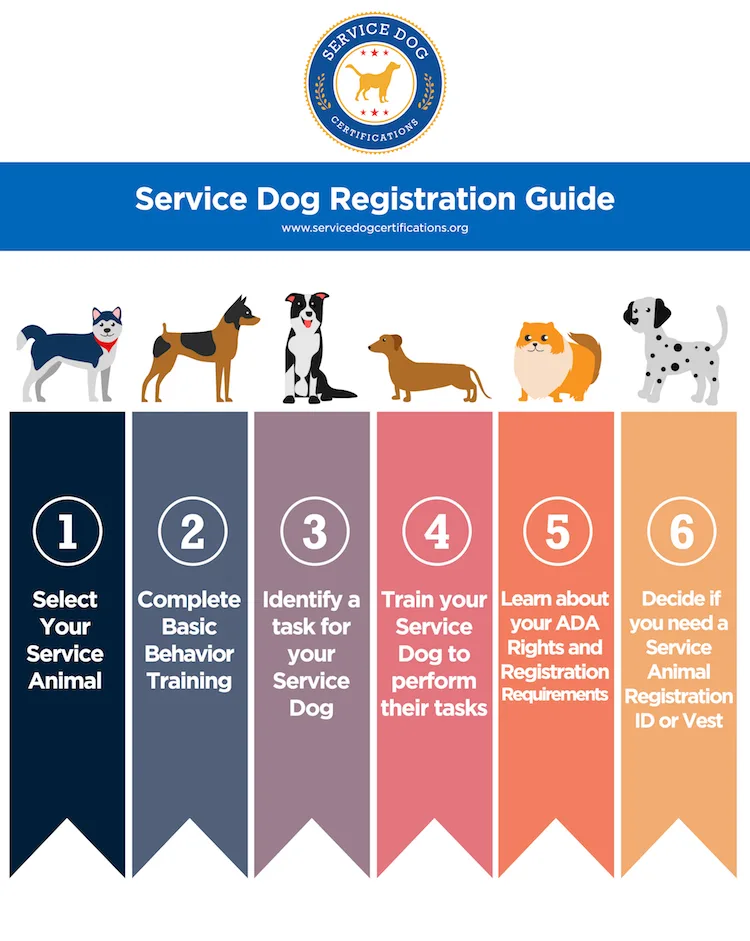How Do I Qualify For a Service Dog if I Have Anxiety and Depression?

For a person living with anxiety or depression, even the most trivial tasks can feel exhausting. To deal with their mental illness, some take medication or schedule consistent therapy sessions. But it’s not widely known that anyone with diagnosed anxiety or depression also qualifies for a psychiatric service dog.
What is a psychiatric service dog?
A psychiatric service dog is a dog that assists a person with a mental illness with their everyday activities. According to the Americans with Disabilities Act (ADA), these dogs perform tasks for their handlers which relate directly to the disability. These dogs typically accompany their handler both inside and outside of their homes and will spend the majority, if not all day, assisting, alerting, and supporting.
Having a service dog does come with some dismay from other individuals who may not understand the handler’s needs. Thus, some handlers decide to also register their Service Dog in order to make the dog’s purpose more transparent.
Who qualifies for a psychiatric service dog?
Potential handlers must undergo a psychiatric evaluation from a healthcare professional. This may be a:
- Physician
- Nurse practitioner
- Licensed social worker
- Psychologist
- Psychiatrist
The professional will discuss the mental experiences and evaluate the particular symptoms. They will provide a diagnosis that is most closely related to what their patient is experiencing.
A person that is diagnosed with a mental illness qualifies for a psychiatric service dog.
The most common mental illnesses that service dogs can assist with are:
- Anxiety
- Depression
- Obsessive-Compulsive Disorder
- Post-Traumatic Stress Disorder
- Disordered Eating
- Panic Disorder
- Agoraphobia

I have anxiety and/or depression. How do I get a psychiatric service dog?
In order to get a psychiatric service dog for anxiety or depression, these steps need to be taken:
1. Get an official diagnosis.
To comply with the ADA, each individual with a disability needs to have a recorded diagnosis from a healthcare professional. Make an appointment with your general practitioner to discuss your symptoms. Your general practitioner may be able to diagnose you, or they may refer you to a mental health professional. If you already see a mental health professional, obtain written proof of your diagnosis and keep it for your records. Common symptoms of anxiety and depression include:
- Feelings of helplessness
- Loss of appetite
- Loss of interest in daily activities
- Stressing or obsessing that is out of proportion to the actual event
- Feeling nervous
- Increased heart rate
- Trouble concentrating
2. Obtain your new service dog.
The ADA doesn’t have requirements for where you get your dog. You may purchase a dog from a breeder, from a site that trains service dogs, or you could rescue one from your local shelter.
When selecting a dog, be sure to look for one that has the temperament needed to be a service dog. They must be calm, patient, eager to please, a fast learner, determined, and have no history of aggression. Without these particular traits, your dog may struggle and become distressed and unhappy.
3. Train your service dog to complete tasks relevant to your particular symptoms.
The ADA requires that all service dogs must be trained to perform tasks that will assist you directly with your mental illness. Service dogs for anxiety and depression may complete the following tasks:
- Detecting panic attacks before they happen
- Providing grounding and physical stimulation during panic attacks
- Fetching medication and water
- Accompanying their handler outside
- Fetching a phone during emergencies
In addition to being task trained, service dogs must also pass a Public Access Test in order to demonstrate the necessary skills for any public setting they may be faced with.
Start your new life
A person with anxiety, depression, or any other mental illness could greatly benefit from a service dog. These dogs can help individuals navigate through their day-to-day lives, and provide the extra support needed for them to feel more comfortable. With the support of a psychiatric service dog, a person has the potential to live a happier, more fulfilled life.
About the Author: The writing team at Service Dog Certifications is made up of folks who really know their stuff when it comes to disability laws and assistance animals. Many of our writers and editors have service dogs themselves and share insights from their own experiences. All of us have a passion for disability rights and animals.
1 comment
Leave a Reply Cancel reply
Latest Posts

Dangerous Materials Hiding in Your Dog Products
Jake’s German Shepherd began developing strange rashes around his collar. Three vet visits later, they figured out the leather was treated with chromium — a chemical that irritates sensitive skin. Jake had no idea his dog’s collar contained industrial chemicals. Most dog owners don’t know what goes into the products they buy. Many companies use […]

Read More

Can You Bring a Service Dog to a Basketball Game?
Yes, you absolutely can bring your service dog to basketball games. Whether you’re heading to your local high school tournament, a packed college rivalry game, or splurging on NBA tickets, the Americans with Disabilities Act protects your right to be accompanied by your service dog anywhere the public can go. When you arrive, venue employees […]

Read More

Best Pet Health Insurance Providers
If you own a pet, you know how important — and expensive — vet care can be. One way to offset those costs is to purchase pet health insurance. Like typical health insurance, pet insurance is available at many price points, and can cover all, most, or only some of your vet-related costs. It can […]

Read More



I have been diagnosed with depression, anxiety, sleep disorder, and bi polar. I also have a liver disease that can cause sleeping and functioning…plus more. I have a dog his name is Rocky. Its not really my dog but we r always together. My dad actually is the owner…he doesn’t mind me to allow Rocky to spend time away from the house. My dad can’t do much for Rocky, so I stepped in. He’s an older dog and would like him to experience more…with me.